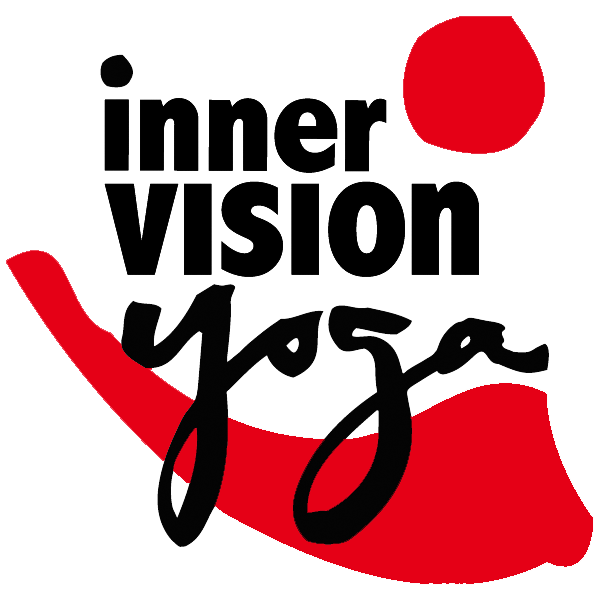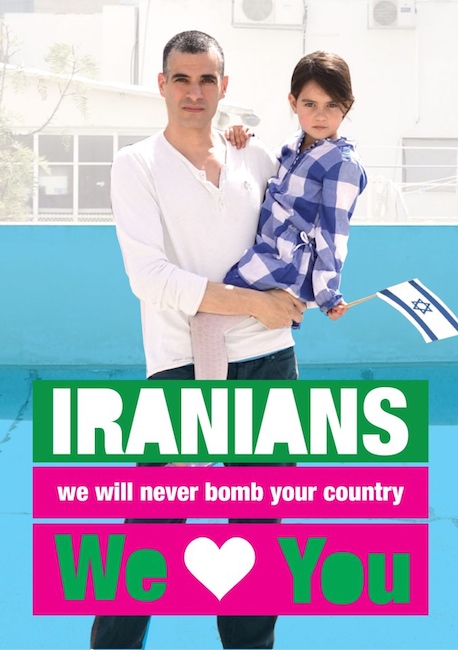by Jeff Martens
There is a man, an Israeli named Ronny Edry who along with many others in Israel, was living in fear. Each day is supposed to be the last day to do something about an impending war looming with Iran. Each country supposedly has targeted thousands upon thousands of missiles at the other. It seemed that all ordinary people can do was just sit around and wait for the inevitable to happen. Ron Edry looked at his family and friends, felt the same frustration that everyone else did, and decided to do something else. A graphic designer by trade, Edry created a poster where he was holding his daughter and a small Israeli flag with the words “We Love You Iran” emblazoned across the bottom. He posted this image on Facebook and went to bed.
Now think for a moment: when you imagine Israel and Iran in the same context, what comes to your mind’s eye? Is it a positive image? A wonderful future? Or something else entirely?
When Edry awoke in the middle of that first night and noticed a lot of activity on his Facebook account, it was the dawning of a new era. Suddenly a source of fear and worry was now a point of inspiration. Hundreds and then thousands of people began to comment positively on “We Love You, Iran” from every country, including Iran! The results are still unfolding today. In an outpouring of love and support, an unprecedented seed has been planted to consider this conflict in a different light.
In the Yoga Sutra written nearly 3000 years ago, Patanjali recognized the power of a positive focus in changing negative states of consciousness.
“We ourselves may act upon unwholesome thoughts, such as wanting to harm someone, or we may cause or condone them in others; unwholesome thoughts may arise from greed, anger, or delusion; they may be mild, moderate, or extreme; but they never cease to ripen into ignorance and suffering. This is why one must cultivate wholesome thoughts.”
Like Patanjali, we all intuitively realize that thinking negatively or feeling negative about a prison or situation creates stress and the physiological signs of fear. For example, if you had to have oral surgery, would you want to have a dentist that was cranky and in a foul mood worrying about some life circumstance? Or would you prefer a surgeon who was feeling compassion, generosity or love? When negativity becomes the norm, the best we begin to hope for is a temporary respite. This is hardly aiming high in life. If we don’t consciously realize this, our bodies sure know it. Cortisol, adrenalin, heart rate and blood pressure, neurotransmitter and peptide chain activity related to emotion are all effected by our state of consciousness, as is our immune, digestive and nervous systems. The reverse is true as well: Positive states of consciousness lead to positive emotions and positive, healing catabolic and metabolic activity in the body. What’s more, a great attitude leads to a great environment. People who are thankful are generally much happier in their life. Those who have a positive attitude set and achieve their goals (Hom and Arbuckle, 1988), become more intelligent (Estrada, Isen and Young, 1997) and are more resilient with higher job satisfaction and work performance (Lyubomirsky, 2005). All of these positive states lead to a more positive perception of the world we live in. We find more evidence for happiness and good in the world simply by looking for it.
Some people may be skeptical that an outpouring of positive emotion can make a difference in any event. More often than not, such individuals will focus on the outside world as the source for their happiness or sorrow. It is easy to forget that heaven or earth is within us, and that the world we see is a world of our own perceptional choices. When you look at the world, what are you choosing? When you look at yourself what are you focusing on? When you look at your neighbor, your enemy, your family, your friend, where are you placing your attention? Are you choosing heaven on earth, or going in the other direction?
Once there was a Samurai who felt a great conflict inside on where he might end up after his death. Before heading off to battle he decided to visit an old Zen Master to see if he might get some clarity on the matter. Upon entering the monastery, many people it seemed, had the same idea that he had on getting consultation. Being a warrior the samurai was not interested in philosophy, for he thought in the most literal terms. He simply wanted an answer specifically for his situation. So the samurai stood with many others seeking a private audience with the Master throughout the day, awaiting his turn impatiently.
At last he was invited to step forward into the Master’s presence. “Master,” the samurai bowed, “Soon I will go off to battle and travel across the countryside in unknown lands. I must know where the gates of hell reside so that I do not step through these gates accidentally. And while you answer this might you also tell me where the gates to heaven are so that I may find and enter through them when the time is right?”
The old Master looked at the samurai a long while without responding. When he finally spoke he offered a question, not an answer. “Who are you?” “I am a samurai,” the warrior answered, his chest puffed with pride. “I am a samurai among samurai. I have fought with the emperor’s army.”
“You are a samurai?” the Master laughed. “Why you look more like a fool than a great warrior.”
Instantly the samurai’s blood began to boil. Without thinking he had reached the the hilt of his sword and was raising it to cut the old man’s head off when the Master held up a single finger. “Here are the gates to hell,” the Master said.
The samurai blinked as if struck between the eyes. The import of this teaching sunk deep into his brain and made its way slowly into his heart. The gut-churning anger subsided in a wave of calmness and he carefully replaced his sword in its sheath.
“And here,” the master smiled, “are the gates of heaven.”
Looking at the world through fear-based eyes, there is much cause for alarm as the experience of hell seems imminent. And yet that same world when looked at consciously through the eyes of love shows us something different and creates different evidence for experiencing heaven. Did you know, for example, that there is a foundation set up solely to reward selfless acts of courage and heroism from anonymous strangers, and there are so many valid applications that they have to constantly raise their standards and requirements to even be considered? Yet few people ever hear about such individuals amid what can be an overwhelming flood of negative news and information.
(hear more about these people now here)
(http://carnegiehero.org/herofund.php)
From ancient yogic texts to Neville Goddard to modern scientific studies, the message is a wonderful one: Change your focus and you will change your world. Offer the highest to another and you will be bathed in that wonder and love. Neville Goddard addresses finding heaven on earth in many of his books when he encourages us to see the highest in others. Goddard inspires us to invest our thoughts in order to create a beautiful return on our investment rather than just spend our thoughts on habitual negativity:
“Whenever you become completely absorbed in an emotional state, you are at that moment assuming the feeling of the state fulfilled. If persisted in, whatsoever you are intensely emotional about you will experience in your world. These periods of absorption, of concentrated attention, are the beginnings of the things you harvest. It is in such moments that you are exercising your creative power -the only creative power there is. At the end of these periods, or moments of absorption, you speed from these
imaginative states (where you have not been physically) to where you were physically an instant ago.
In these periods the imagined state is so real that when you return to the objective world and find that it is not the same as the imagined state, it is an actual shock.” -Neville Goddard, Awakened Imagination pp. 51-52
When Edry posted that image of love for Iran he changed not only the way that he was choosing to perceive the other country, he also changed the world within his body and the extracellular environment around his cells. This in turn led to a recognition of a different perception that was mirrored by others, including and Iranian girl who is forced to walk across the Israeli flag each day she goes into school. Now the flag is beautiful to her, now each day when she walks across it she feels love instead of hate. Iranians began to respond to Edry’ spouts with posters of their own. We will never bomb you Israel. We love you Israel. We are not ready to die in other people’s war.
Now supposed enemies are communicating with each other. Now the two people are looking at each other as something other than enemies. Now the two people can even look at each other as friends.
How you choose to perceive an event is the most powerful choice you can make. Today the average person is bombarded by negative information at a scale that would have been incomprehensible 150 years ago and inconceivable 300 years ago. In fact much of this is deliberate. When it comes to advertising or being manipulated into making unconscious decisions, fear sells, sex doesn’t. (Lindstrom, 2008). Yet fear is also very reactionary, utilizing more of our emotional precognitive brain. Our interconnectedness through the media and internet is unprecedented today. Fear sells ad space and boosts circulation so a lot of this interconnectedness bandwidth is occupied by worry-inducing fear-building and doubt-fostering perceptions.
In the groundbreaking book Power vs Force, David Hawkins talks about the power of positive and negative states of consciousness. Negative emotional states can be very prevalent, but because they are based on struggle and isolation they must rely on force to perpetuate themselves. Force always begets more force and leads to a cultivation of resistance. Positive states of consciousness are much more powerful than negative emotions and raise our vision to something a bit higher than a just a temporary respite from incessant worry.
Edry’s post was taken up by hundreds of thousands and then millions across the globe from China, Costa Rica, and Europe to the United States, Palestine. The message of “We Love You” has now spread throughout the world. Over two million people and counting are visiting the post. And tens of thousands of these have made posters of their own. Now there is a whole movement called “Not Ready to Die in Your War.” In fact at this level of communication it does feel like “Their” war, like someone else’s war, because the individual people have taken themselves out of identifying and defining themselves based on the conflict. Options have been expanded and a new vision has been raised.
Giving Your Best
You may desire something for yourself or you may desire for another. If you desire something for another make sure that the thing desired is acceptable to that other. The reason for this warning is that your consciousness is God, the giver of all gifts. Therefore, that which you feel and believe to be true of another is a gift that you have given to him. The gift that is not accepted returns to the giver. Be very sure that you would love to accept the gift yourself for if you fix a belief within yourself as true of another and he does not accept this state as true of himself, this unaccepted gift will embody itself in your world. Always hear and accept as true of others that which you would desire for yourself. In so doing you are building heaven on earth. “Do unto others as you would have them do unto you” is based upon this law….. Your heaven is defined by the state of consciousness in which you live, which state is made up of all that you accept as true of yourself and true of others.”
When you give a gift it moves through you to get to the object of your focus. As a result you are always experiencing what you give. Why do we choose to see the worst in ourselves and others when seeing the highest can be so much more rewarding? People like this graphic designer from Israel will be the ones who change the world. This world will not be changed by politicians or dictators or coalitions. It will be changed by simple ordinary folks like Edry and YOU. People choosing to change their perception and the way they want to see the world.
Can you envision peace? Healing? Abundance? A job for the guy begging for money beside the freeway? Healing for the sick friend? Peace for the war-ravaged psyche? Harmony between countries and the world? If not what is limiting you? How can this ever work in real life anyway, with a real war?
In December of 1914 a strange event was happening – soldiers from Germany and England were meeting in no man’s land and began to talk to one another. They helped each other bury their dead, shared food and ceremonies and even played football. Periods of fighting would be marked by soldiers aiming their rifles above enemy heads and marksman snipers deliberately hitting the ground near targeted soldiers without actually hitting them. Commanders on both sides were troubled: how on earth can you have a war if no one wants to kill the other side? eventually commanders forced their soldiers to resume hostilities, but in these brief few days around Christmas in 1914, this was not the soldier’s war, it was “Their” war.
“Their” war can be another country’s war, or another nationality or religion’s war. Their war can also be the war being brought to you by the one who cuts you off in traffic or the war of an illness or financial crises. The world may seem out of control, but this need not be the case for your attention. Where do YOU choose to place it now? The greatest gift that you can give is your attention aimed to its highest pinnacle. You were made in the image of God. Rather than getting caught up in other people’s wars, why not invest your attention in the highest you can possibly see for yourself and others?
You just might create the very best that life has to offer. For yourself and for the world you live in right now.
Jeff is leading a third Fear to Clear Workshop at Inner Vision Yoga starting January . Click here for more info.
citations:
Hom, H.L., & Arbuckle, B. (1988). Mood induction effects upon goal setting ad performance in young children. Motivation and Emotion, 12, 113-122.
Estrada, C.A., Isen, A.M., & Young, M.J. (1997). Positive affect facilitates integration of information and decreases anchoring in reasoning among physicians. Organizational Behavior & Human Decision Processes, 72, 117-135
2005: The Benefits of Frequent Positive Affect: Does Happiness Lead to Success? Sonja Lyubomirsky, Laura King Psychological Bulletin 2005, Vol. 131, No. 6, 803–855
Martin Lindstrom: Buyology: Truth and Lies About Why We Buy, 2008


